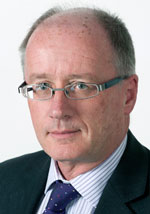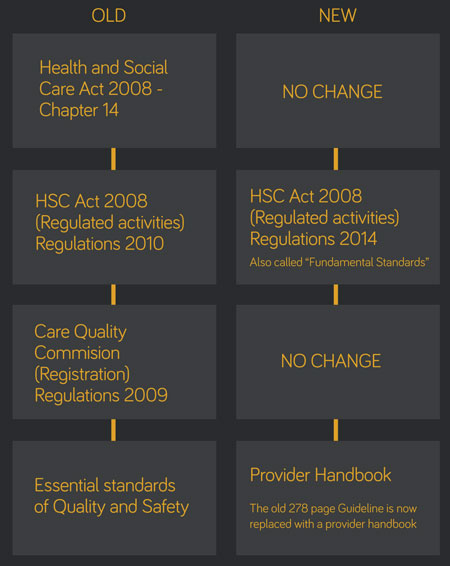In the hot seat with... Professor Nigel Sparrow
Post date: 10/02/2014 | Time to read article: 4 minsThe information within this article was correct at the time of publishing. Last updated 18/05/2020
Professor Nigel Sparrow, senior national GP advisor at the CQC, chats to Charlotte Hudson about the regulator’s new ratings for GP surgeries
From October, the CQC will begin to rate GP surgeries in England as Outstanding, Good, Requires Improvement or Inadequate. For a GP surgery to be Outstanding or Good, it will have to demonstrate that it is compassionate, caring, open, transparent, that it learns from its mistakes, seeks to make sure there are no barriers to accessing care for its patient population, and that it has a person-centred approach to care.
Good, Requires Improvement or Inadequate. For a GP surgery to be Outstanding or Good, it will have to demonstrate that it is compassionate, caring, open, transparent, that it learns from its mistakes, seeks to make sure there are no barriers to accessing care for its patient population, and that it has a person-centred approach to care.
A practice will have to show that it makes sure people are able to see a doctor when they need to and that they do not have to wait too long for appointments.
What do practices need to do?
Practices need to be proactive in assessing and monitoring the needs of their population, including for people in vulnerable circumstances, such as the elderly, homeless people, traveller communities, and those with mental health needs. You have to demonstrate that you are reaching out to these communities, including making sure that people can register with a GP if they have no fixed abode and that they can access the practice’s services without fear of stigma or prejudice.
How does the new inspection methodology work?
The CQC’s new methodology covers five domains: are services safe, effective, caring, well-led and responsive to people’s needs? In general practice we will be looking at six population groups: working age and those recently retired, people with mental health conditions, people with long-term conditions, vulnerable excluded groups, older people and mums, babies and children.
There will be a GP at every visit and each visit will be clinically led and led by specialist inspectors.
How will the new rating system work?
In each of those five domains we’re finding out what good practise looks like across the six population groups. As well as fulfilling our regulatory function we also want to celebrate good practise.
Each practice will get a rating over five domains and six population groups and an overall aggregate rating.
Do you think the new system will improve general practice?
The CQC is not an improvement agency, but we are there to encourage improvement. By describing what good practise looks like, practices will be able to see where they need to improve in comparison. I see this as a practice appraisal; they can showcase what they’ve done well and hopefully where they see their development areas.
What are the next steps?
We are running a pilot over the next few months and will be implementing our new regulations and the new model from the end of October. Every GP surgery in England will have been inspected and rated by April 2016.
We are also visiting CCGs, and will visit 25% of practices during this time. We will be talking to the area team and the CCG prior to visit to get to know about the health community. All of our visits will be calibrated, so practices visited in Cornwall will be the same as visits in Yorkshire. Quality is really important to us too so we’ll be quality assuring all of those visits.
What does health and social care look like in England?
Every October, the CQC reports on the state of health and adult social care in England – what hospitals, GP surgeries, care homes and other services are doing well, what is causing concern and any improvements that should be made.
The findings are based on published evidence and what inspectors have witnessed on the 35,000+ inspections that they carry out every year.
Last year, the CQC found that more than half a million people aged 65 and over were admitted to A&E with potentially avoidable conditions, and that people with dementia continue to have poorer outcomes in hospital, which suggests that GPs and social care services could be working together better.
The findings in their latest report help to identify common problems so that services can improve the care they provide for people across the country.
What’s changing
The new changes come in three distinct phases:
- October 2014: The new inspection model comes into force
- April 2015: The Fundamental Standards come into force (subject to Parliamentary approval)
- April 2015: New ‘Duty of Candour’ makes it a criminal offence if patient is not told true facts of incidents, in a face-to-face meeting New ‘Fit and Proper Person’ test will become a statutory duty. It will be an offence not to comply or if you do not remove an unfit person from the management.
Which legislation is changing

The CQC’s top changes
- Better, more systematic use of people’s views and experiences, including suggestions and complaints.
- New expert inspection teams including trained inspectors, clinical input led by GPs and nurses, practice managers and GP Registrars.
- A rolling programme of inspections carried out systematically in each CCG area across England.
- Inspections of GP out-of-hours services to be incorporated into CCG area programmes.
- A focus on how general practice is provided to key patient groups, including vulnerable older people and mothers, babies and children.
- Tougher action in response to unacceptable care, including where necessary closing down unsafe practices.
- Ratings of all practices to help drive improvement and support people’s choice of surgery.
- Better use of data and analysis to help us to identify risk and target our efforts.
- Clear standards and guidance to underpin the five key questions we ask of services: are they safe, effective, caring, responsive and well-led?
- Close collaborative working with CCGs and Local Area Teams of NHS England to avoid duplication of activity.
Source: CQC, A fresh start for the regulation and inspection of GP practices and GP out-of-hours services.
